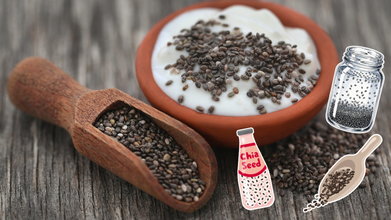- Health Conditions A-Z
- Health & Wellness
- Nutrition
- Fitness
- Health News
- Ayurveda
- Videos
- Medicine A-Z
- Parenting
How Can Ayurveda Balance Your Gut and Mind? Find Out

How Can Ayurveda Balance Your Gut and Mind? (Credit: Canva)
Ayurveda is a 5000 year old holistic healthcare science that emphasizes on the importance of holistic wellness – body, mind and emotions. It understands the impact your digestive health has on your mental health and vice versa.
In ayurveda, the core philosophy is Agni or digestive fire, which plays a crucial role in improving our physical health and also our ability to process emotions, and mental faculties. A strong agni allows us to maintain healthy mental clarity, while weak agni can lead to digestive health issues, which then impacts our emotional state and mental health.
Our gut is connected to our mind through a direct neurosis that sends messages every micro million second. It is important that our gut is healthy, clean and toxin free, to allow healthy signals to be transmitted back to the brain.
When our gut health is impacted, it signifies vata and pitta imbalance. Vata is dominant in the large intestine and colon, and when vata is imbalanced it causes bloating, indigestion, gas, flatulence, constipation, and colon health issues. An unhealthy colon can itself trigger 90% of our ailments and chronic diseases right from constipation to cancer, cold to clinical depression.
Pitta is dominant in our stomach and small intestine, and pitta imbalance can trigger burning sensation, acidity, reflux, digestive health issues and even IBS and diarrhoea.
Each dosha has a direct impact on our mental state as well. When vata is imbalanced it leads to colon health issues and also triggers anxiety, overthinking, worry and fear in the mind. Pitta imbalance leads to stomach issues and triggers anger, irritability, restlessness in the mind.
How can you better maintain your gut health and mental health?
The best way is through nutritious foods and eating the correct diet that has been tailormade for your individual prakriti.
Consume fresh, seasonal and local foods that allows your body to acclimatise to the local topographic region and the regional bacteria. This improves your gut flora, and digestive health. It improves your circadian rhythm too, as you sync yourself to your natural flora and fauna.
You can also consume gut friendly spices like turmeric which helps reduce inflammation, while cumin seeds, fennel seeds are carminative which improves digestion. Be conscious of your eating habits, and eat only 80% of your appetite.
Eat only when hungry and ensure to sit down peacefully for a meal without any technology or distractions. This allows you to better digest food, absorb nutrients and improve your energy levels too.
You must also walk 100 steps after every meal to aid digestion and ensure to engage in physical activity everyday which improves your blood circulation and elimination of waste.
Ayurveda understands that the gut, is called the second brain, as its directly linked to the central nervous system via the vagus nerve. This vagus nerve is responsible for the bidirectional communication between gut health and mental health. Impaired gut health will lead to digestive health issues and psychosomatic imbalances too.
You can also engage in yoga, meditation practices that improves your ability to stay calm, relaxed and enhance your gut health as well as mental health.
Superfood Chia Seeds Can Also Be Risky For Some, Know Who They Are

Credits: iStock/Canva
Chia seeds, a superfood as we all know and have a number of benefits, however, if not taken properly, it can increase risks and could worsen your health, says Dr Shubham Vatsya, a gastroenterologist, and hepatologist at Fortis Vasant Kunj. He is known for making health related content on his Instagram page, targeting foods and habits that impact gut health, liver, and more.
In one of the videos which garnered over one million views, he talks about the risk of chia seeds. The video is titled 'Chia Seeds Are Not For Everyone".
What Are The Risks Of Consuming Chia Seeds?
Dr Vatsya points out that if chia seeds are consumed without knowing how your body works and without proper hydration, it could worsen your health.
Talking about who should be more careful before making chia seeds part of their diets? He gives four instances:
People With Low Blood Pressure Should Avoid Chia Seeds
He says many people, especially many women have low blood pressure and they may have included chia seeds in their diet without knowing much about it. Why does this happen? Chia seeds contain quercetin, which is an antioxidant and it could reduce your risk of several health condition, including heart diseases. However, points out Dr Vatsya, it is high in fiber, which could further lower your blood pressure. If you already have a low blood pressure, this could cause you a health risk.
People Who Are On Blood Thinning Medicines Should Avoid Chia Seeds
Doctor says that people who are on blood thinning medicines like aspirin, especially after a heart stent, may be at risk. Why? Because chia seeds can have a blood thinning effect due to its omega-3 fatty acids content. This can increase bleeding risk. So, people on prescription blood thinners or anticoagulants like warfarin or aspirin, must avoid it.
Hydration Is Must
Chia seeds are high in fiber, which is why it is important to maintain enough hydration. What happens if you do not keep yourself hydrated enough?
Chia Seeds Could Upset Your Stomach
While getting enough fiber helps prevent and manage constipation, however, the doctor points out consuming significant amounts of fiber can cause digestive issues like gas, bloating, and abdominal pain, if not hydrated.
Hydration is the key, this is what supports bowel movement regularity and prevent any adverse effects. Furthermore, one should always add fiber to their diet in small amounts and gradually.
Read: Hair Loss In Men: Is It Related To Sweetened Drinks?
Chia Seeds Could Worsen Your Kidney Problem
Lastly, the doctor says that while chia seeds are healthy, but individuals with chronic kidney disease must be careful while consuming.
Chia seeds are rich in potassium and phosphorous. In per 2.5 tablespoon of serving, it contains 115 mg of potassium and 244 mg of phosphorous. Both these nutrients are closely monitored in people with kidney disease. Chia seeds are also high in oxalate, which can attach to calcium to form kidney stones. This is why it is important to maintain your hydration while consuming chia seeds.
Note: This is a user-generated content via Dr. Shubham Vatsya. Health and Me does not take responsibility of the content. Always consult a registered nutritionist or dietitian and your doctor before making changes to your diet.
Hair Loss In Men: Is It Related To Sweetened Drinks?

Credits: iStock/Canva
Hair loss in men is often blamed on genetics, age, or stress. But as lifestyle-linked health problems grow, doctors are taking a closer look at everyday dietary habits, including the regular consumption of sugar-sweetened beverages. While these drinks are not a direct cause of baldness, emerging evidence suggests they may quietly worsen hair loss in men who are already genetically predisposed.
“Hair loss is rarely caused by a single factor,” says Dr. Vineet Malhotra, Head of Urology and Director at VNA Hospital. “But excessive sugar intake can act as an important trigger, especially in men prone to androgenetic alopecia.”
How Sugary Drinks Disrupt Hormones Linked to Hair Loss
Sugar-sweetened beverages such as sodas, packaged fruit juices, energy drinks, and sweetened teas cause a rapid spike in blood glucose levels. To manage this surge, the body releases insulin. When this happens repeatedly over time, it can lead to insulin resistance.
“Chronic insulin resistance is known to disturb hormonal balance,” explains Dr. Malhotra. “It can increase circulating androgens and speed up the conversion of testosterone into dihydrotestosterone, or DHT.”
DHT is the hormone most strongly associated with male pattern baldness. Higher levels of DHT cause hair follicles to shrink, shorten the hair growth cycle, and gradually turn thick hair into finer, weaker strands.
The Inflammation Link: Why the Scalp Suffers
High sugar intake is also closely tied to low-grade systemic inflammation. While this inflammation may not be immediately noticeable, it affects blood vessels throughout the body, including the tiny capillaries that supply oxygen and nutrients to hair follicles.
“When microcirculation is compromised, follicles do not receive adequate nourishment,” says Dr. Malhotra. “This can slow hair growth and increase hair shedding.”
Inflammation can also push hair follicles out of the growth phase and into the resting phase prematurely. The result is often diffuse thinning rather than patchy bald spots, something many men notice before visible hair loss becomes obvious.
Metabolic Health, Gut Health, and Nutrient Deficiencies
Frequent consumption of sugary drinks is linked to weight gain, fatty liver, and metabolic syndrome, all of which can disrupt hormonal balance. Poor metabolic health can alter cortisol levels and insulin-like growth factors, both of which influence how hair follicles function.
Equally important is what high-sugar diets tend to replace. “Men who consume a lot of sugary drinks often miss out on nutrient-dense foods,” Dr. Malhotra notes. This increases the risk of deficiencies in zinc, iron, biotin, protein, and other nutrients essential for healthy hair structure and growth.
What Studies Are Showing So Far
Recent observational studies have found a higher prevalence of early-onset hair loss in young men who consume sugar-sweetened beverages daily compared to those who drink them occasionally. While these studies do not prove a direct cause-and-effect relationship, the association is strong enough to raise concern.
“The impact appears more pronounced in men with a family history of baldness,” says Dr. Malhotra. “In such cases, diet may accelerate hair loss rather than initiate it.”
Sugar Is Not the Only Culprit, But It Matters
It is important to note that sugary drinks alone do not cause hair loss. However, when combined with genetic susceptibility, high stress, poor sleep, smoking, and physical inactivity, excessive sugar intake can significantly worsen scalp health and hair thinning.
Reducing sugar-sweetened beverages, improving overall diet quality, maintaining stable blood sugar levels, and supporting metabolic health may help slow hair loss and promote healthier hair over time.
Why Doctors Are Now Asking About Diet
In clinical practice, men presenting with unexplained or rapidly worsening hair loss are increasingly being asked about their dietary habits, alongside hormonal and nutritional evaluations.
“Cutting back on sugar-sweetened drinks benefits the heart and metabolism,” Dr. Malhotra says. “But it may also offer long-term support for hair health, especially in men at risk of early hair loss.”
While genetics may set the stage, everyday choices often decide how quickly the story unfolds.
Soup Debate: Chicken Or Tomato? A Dietitian Finally Answers Which One Is Healthier

Credits: Canva
Soup debate between chicken and tomato may have come to an end, with a dietitian telling us which one is the healthier option. For many Americans, January is the National Soup Month, which means they go back to their comfort and easy to make food like soup. With the surge in flu activity in the US, people are consuming soup to get relief. Amid all this, Vandana Sheth, a plant-based dietitian and a diabetes expert tells Fox News the better option. The California-based dietitian says that both soups could be comforting. However, she points out, the nutrition profiles could vary based on the preparation.
Chicken Soup Vs Tomato Soup
Soup's nutrition profile runs through a spectrum of healthy to fatty and caloric. "Choose versions with no added sugars, minimal saturated fat and lower sodium to keep them healthy. When able, enjoy homemade or minimally processed options with fresh vegetables, lean protein and other fiber-rich options," she said.
Also Read: NHS England Expands Access To Life Saving Prostate Cancer Drug
What Is In A Chicken Soup?
Michelle Routhenstein, a New York-based cardiologist, as reported by Fox News, said a standard serving size of chicken noodle soup, which is around one cup, usually contains somewhere around 100 to 150 calories, with 6 to 10 grams of protein, and 500 to more than 1500 milligrams of sodium.
However, Routhenstein also says that homemade chicken soup could also provide lean protein, B vitamins, and immune supporting zinc. There have been studies that show that chicken soup have eased many from their cold symptoms, like nasal congestion and anti-inflammatory effects. However, not all chicken soups are safe. Commercially prepared soups may have a higher level in sodium, which could have a negative impact on blood pressure.
What Should One Keep In Mind?
When buying chicken soup, one should always check labels for its sodium content and ensure it must be under 500 milligrams per servings. Sheth also suggests looking out for added sugars and flavors. Sheth also said if the soup is made with lean chicken, vegetables and has a light broth, it can by more nutrient rich. She also recommends to avoid cream-based broth, which could be higher in saturated fat.
What Is In A Tomato Soup?
Tomato soups have a completely different nutrition profile. "Per 1 cup serving, you will get 70–150 calories depending on [whether] it's broth-based or cream-based, lycopene and vitamins A and C, which can help support eye health and immunity," Sheth said. The sodium content could be lower than in chicken soup, somewhere between 400 to 900 milligrams, especially in canned versions.
Sheth said that when compared to chicken soup, tomato soup trails on protein scale. While Routhenstein highlighted lycopene, as one of the biggest benefits of tomato soup. It is an antioxidant that "may help with reducing inflammation, heart disease and immune health".
"Lycopene has also been studied for its benefit [in reducing the] risk of prostate cancer. Tomato soup is also rich in vitamin C and potassium, which also protect heart and immune health," she added.
Which Soup Is Better?
Routhenstein says for her, it is tomato soup, because of antioxidant content. However, when it comes to protein and keeping you full, Sheth says chicken soup is a better option.
© 2024 Bennett, Coleman & Company Limited

